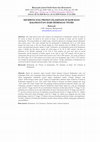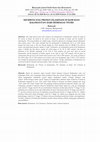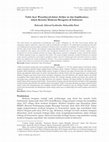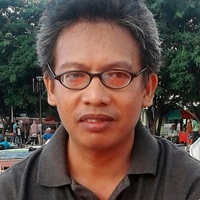Books by rahmadi rahmadi

Pidana Pasal 113 (1) Setiap Orang yang dengan tanpa hak melakukan pelanggaran hak ekonomi sebagai... more Pidana Pasal 113 (1) Setiap Orang yang dengan tanpa hak melakukan pelanggaran hak ekonomi sebagaimana dimaksud dalam Pasal 9 ayat (1) huruf i untuk Penggunaan Secara Komersial dipidana dengan pidana penjara paling lama 1 (satu) tahun dan/atau pidana denda paling banyak Rp 100.000.000 (seratus juta rupiah). (2) Setiap Orang yang dengan tanpa hak dan/atau tanpa izin Pencipta atau pemegang Hak Cipta melakukan pelanggaran hak ekonomi Pencipta sebagaimana dimaksud dalam Pasal 9 ayat (1) huruf c, huruf d, huruf f, dan/atau huruf h untuk Penggunaan Secara Komersial dipidana dengan pidana penjara paling lama 3 (tiga) tahun dan/atau pidana denda paling banyak Rp 500.000.000,00 (lima ratus juta rupiah). (3) Setiap Orang yang dengan tanpa hak dan/atau tanpa izin Pencipta atau pemegang Hak Cipta melakukan pelanggaran hak ekonomi Pencipta sebagaimana dimaksud dalam Pasal 9 ayat (1) huruf a, huruf b, huruf e, dan/atau huruf g untuk Penggunaan Secara Komersial dipidana dengan pidana penjara paling lama 4 (empat) tahun dan/atau pidana denda paling banyak Rp1.000.000.000,00 (satu miliar rupiah). (4) Setiap Orang yang memenuhi unsur sebagaimana dimaksud pada ayat (3) yang dilakukan dalam bentuk pembajakan, dipidana dengan pidana penjara paling lama 10 (sepuluh) tahun dan/atau pidana denda paling banyak Rp 4.000.000.000,00 (empat miliar rupiah).

This study discusses four issues related to the Islamization in Kalimantan, namely the origin of ... more This study discusses four issues related to the Islamization in Kalimantan, namely the origin of the arrival of Islam, the period of the arrival of Islam, the spreader of Islam, and the channels of Islamization. These four problems are studied using a historical approach by analyzing relevant information from various sources. This study concluded that the Islamization in Kalimantan led to an Arab theory, namely that Islam came to this area directly brought by Arabs themselves from the Middle East, both by traders and professional preachers (ulama or Sufi). Furthermore, the Islamization period of the Kalimantan region is divided into four phases, namely the arrival phase in the 7th to 10th centuries; the phase of formation of the Muslim community in the 11th to 15th centuries; the great wave phase of coastal Islamization and the formation of Islamic empires in the 16th to early 17th centuries; and the phase of Islamization from the coast to the interior that occurred in the 17th to 19th centuries. The carriers of Islam at the arrival stage (7th to 12th centuries) were traders, and at the development stage (13th to 17th centuries) were brought by professional preachers (wandering Sufi scholars). Finally, Islamization in Kalimantan was carried out using the channels of da'wah, politics, trade, marriage, and education.

This study discusses four issues related to the Islamization in Kalimantan, namely the origin of ... more This study discusses four issues related to the Islamization in Kalimantan, namely the origin of the arrival of Islam, the period of the arrival of Islam, the spreader of Islam, and the channels of Islamization. These four problems are studied using a historical approach by analyzing relevant information from various sources. This study concluded that the Islamization in Kalimantan led to an Arab theory, namely that Islam came to this area directly brought by Arabs themselves from the Middle East, both by traders and professional preachers (ulama or Sufi). Furthermore, the Islamization period of the Kalimantan region is divided into four phases, namely the arrival phase in the 7th to 10th centuries; the phase of formation of the Muslim community in the 11th to 15th centuries; the great wave phase of coastal Islamization and the formation of Islamic empires in the 16th to early 17th centuries; and the phase of Islamization from the coast to the interior that occurred in the 17th to 19th centuries. The carriers of Islam at the arrival stage (7th to 12th centuries) were traders, and at the development stage (13th to 17th centuries) were brought by professional preachers (wandering Sufi scholars). Finally, Islamization in Kalimantan was carried out using the channels of da'wah, politics, trade, marriage, and education.
vi Kami menyadari sepenuhnya bahwa kandungan buku ini memiliki banyak kekurangan. Kekurangan yang... more vi Kami menyadari sepenuhnya bahwa kandungan buku ini memiliki banyak kekurangan. Kekurangan yang ada akan menjadi masukan bagi kami untuk terus menggali dan meng-up date informasi dari sumber-sumber baru yang belum didapatkan ketika buku ini ditulis. Pembacaan ulang juga akan dilakukan untuk meminimalisir kekeliruan data dan kesalahan interpretasi yang mungkin saja terjadi, mengingat banyak aspek yang dibahas pada buku ini. Kritik dan saran juga akan sangat membantu kami dalam melakukan revisi isi buku ini ke depan.
Papers by rahmadi rahmadi
Belajar al-Asma` al-Husna 2: al-Rahman, 2025
-

Banjarese Scholars and the Evolution of Islamic Education in South Kalimantan Circa 1900-1950, 2024
This article provides a historical overview of Banjarese scholars who were alumni of the Middle E... more This article provides a historical overview of Banjarese scholars who were alumni of the Middle East and Islamic organizations in South Kalimantan, as well as their roles in the development of Islamic educational institutions in the early 20th century. The research employs historical methods with a social-intellectual history approach. The study reveals a significant increase in the number of Middle Eastern alumni in early 20th-century South Kalimantan. These scholars studied in Haramain and Egypt (al-Azhar) during that period. Concurrently, with the rise in the number of Middle Eastern alumni, various Islamic organizations emerged, both locally and nationally. These organizations included Sarekat Islam, Muhammadiyah, Nahdlatul Ulama (NU), and Musyawaratuththalibin (MTH). Both Middle Eastern alumni and these Islamic organizations collaborated and contributed to establishing Islamic educational institutions, particularly madrasahs, in various regions. They successfully transformed traditional educational systems of majelis taklim (study circles or religious study gatherings) and langgar barangkap (a two-story small mosque) into madrasahs. Some of these madrasahs served as precursors to institutions that later evolved into Islamic boarding schools in the second half of the 20th century. The traditional education system underwent a shift towards a more modern approach, incorporating classical education and general knowledge into the madrasah curriculum. They also established madrasah associations to coordinate and standardize madrasah education systems. Furthermore, they initiated the establishment of Islamic higher education institutions, although this was not fully realized in the early 20th century
Belajar al-Asma` al-Husna: al-Rahman, 2024
-
Al-Asma` al-Husna: Allah, 2024
Khazanah : jurnal studi Islam dan humaniora, Jul 30, 2023

Jurnal Ilmiah Ilmu Ushuluddin
Artikel ini membahas tentang tafsir ayat wasathiyyah pada QS. Al-Baqarah [2]: 143 dari sejumlah m... more Artikel ini membahas tentang tafsir ayat wasathiyyah pada QS. Al-Baqarah [2]: 143 dari sejumlah mufassir baik klasik, modern, maupun kontemporer ditambah dengan pengkaji konsep wasathiyyah dalam Al-Quran. Interpretasi terhadap wasathiyyah tersebut kemudian dilihat implikasinya terhadap praktik moderasi beragama di Indonesia yang tengah disosialisasikan oleh sejumlah pihak. Moderasi beragama yang berbasis pada konsep wasathiyyah sebagaimana yang telah dijelaskan oleh sejumlah mufassir dan peneliti menunjukkan bahwa moderasi Qurani merujuk pada karakter adil, seimbang, setimbang, memilih yang terbaik, yang terindah, dan yang paling utama, memiliki posisi yang tinggi, konsistensi atau istiqamah, ketepatan, dan dengan karakter itu masyarakat muslim menjadi ummat teladan bagi masyarakat lainnya. Konsep moderasi beragama yang telah disosialisasikan di Indonesia telah mengandung berbagai karakter yang disebutkan oleh sejumlah mufassir dan pengkaji Al-Qur`an dan dapat diperkaya lagi dengan...

Uploads
Books by rahmadi rahmadi
Papers by rahmadi rahmadi